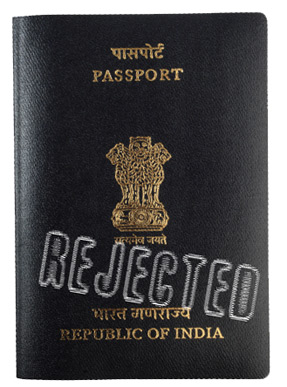|
The Indian government introduced new rules on May 7 requiring Indians
who acquire the citizenship of another country to surrender their Indian
passport and secure a surrender certificate at a cost of $175.
The abruptness with which the rules were implemented without any
advance warning, the heavy application costs and the even steeper penalties,
have prompted widespread outrage among overseas Indians. An online petition
protesting that the new rules impose an “undue and unnecessary burden” had
garnered 21,387 signatures by May 28. Irate overseas Indians have even
demonstrated outside the Indian consulate in New York.
The rules impose stiff financial penalties for failure to secure a
surrender certificate within three months of acquiring foreign citizenship:
$250 for retaining a passport beyond three years; $625 for retaining it beyond
five years; $175 for a lost or damaged passport; $1,250 for using the Indian
passport for travel after acquiring foreign citizenship, etc. Even more
significantly, counselor services will be denied to those failing to comply.
Perhaps the most outrageous aspect of the new rules is their ex post
facto application to millions of overseas Indians who acquired foreign
citizenship over the past several decades, years before the changes were
introduced. In many instances, they have long lost, misplaced or otherwise
disposed of their Indian passports. Many will likely not even become aware of
these new rules until they contact an Indian consulate for a visa or some other
consular service. Absurdly, even those who, of their own volition, went through
the trouble of having their Indian passports canceled at an Indian mission in
the past are required to secure a surrender
certificate and pay a $20 fee.
The new rules are presumably motivated by security concerns. But there
can be no justification for the onerous fees, nor for the retroactive
application of the rules.
Section 9 of the Indian Citizenship Act of 1955 automatically
terminates Indian citizenship upon the acquisition of foreign citizenship: “Any
citizen of India who by naturalization, registration or otherwise voluntarily
acquires … the citizenship of another country shall, upon such acquisition or,
as the case may be, such commencement, cease to be a citizen of India.”
The Indian government, including the Ministry of Overseas Indian
Affairs, which is tasked with advocating the interests of overseas Indians, has
been conspicuously silent in the face of widespread public protests.
Off-the-record, Indian consulates have contended that the rules only represent
a more “vigorous enforcement” of existing law.
The argument is disingenuous. Section 8 of the Citizenship Act,
provides for the voluntary renunciation of citizenship: “If any citizen of India of full age and
capacity, who is also a citizen or national of another country, makes in the
prescribed manner a declaration renouncing his Indian citizenship, the
declaration shall be registered by the prescribed authority; and, upon such
registration, that person shall cease to be a citizen of India….”
The new rules, in effect, are making a hitherto voluntary act
compulsory through executive fiat, in violation of the Indian Citizenship Act —
and using the threat of stiff fines and denial of consular services to compel
compliance.
|



You must be logged in to post a comment Login